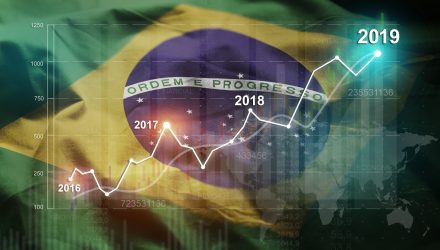Political and economic factors continue to weigh on Brazil as the country continues to forge on after undergoing an overhaul in its leadership. Last year, with the election of the polarizing Jair Bolsonaro, the message Brazilian voters communicated to the world was anti-establishment is in and traditional politics is out.
However, now the real work begins and investors of Brazil-focused exchange-traded funds (ETFs) will be keeping a watchful eye on the early goings of Bolsonaro’s presidency.
“A big bounce in Brazil’s yearly industrial production growth (up 7.1% in May) masked yet another broad-based sequential decline (18 out of 26 industrial sectors),” wrote Natalia Gurushina, an economist for Emerging Markets Fixed Income at VanEck. “The sharp year-on-year increase was due to a low base.”
“Brazil’s manufacturing has yet to reap the cyclical benefits of low interest rates and easier financial conditions,” Gurushina noted. “One of the reasons is uncertainty about the pension reform bill, which is currently waiting for congressional approval. However, there is also growing realization that the bill alone will not solve the low growth problem. Lifting potential output would require more structural adjustment in the form of tax and labor market reforms, but it remains to be seen whether the government has enough political capital left to get these changes approved.”
A Radical Regime Change
Brazilian voters went to the polls last year and the far-right candidate Bolsonaro emerged as the victor, racking up 55% of the votes to win the presidency of the largest country in Latin America after beating out leftist Fernando Haddad. Bolsonaro’s runoff-election victory came after the first round saw him take the early lead with a better-than-expected 46.7% of the votes, while Fernando Haddad came in second with 28.5%.
Bolsonaro is inheriting a bevy of problems he must address during the course of his presidency and the faith of Brazil’s populace will hinge upon his success. Of course, Bolsonario’s biggest task is to help extract the country from its current economic doldrums, but his election is perceived by market experts as one that leans toward the benefit of the country’s capital markets.
This bodes well for Brazilians as the economy will be first and foremost on their minds since the country has been slow to recover after it experienced its worst recession to date. Unemployment levels remain high with double-digit figures and the country is drowning in public debt—74% of Brazil’s GDP.
While the annual GDP growth has posted positive gains as of late, it’s still not at a level where economists are optimistic about the future growth prospects. Prior to the election, the ideal situation to address Brazil’s current financial woes was to elect a president who is market-friendly to help stymie the issues by effecting policies that favor economic expansion and growth—now, they potentially have that in Bolsonaro.
With a much-needed shock to its political system, Bolsnaro could be the solution that Brazil needs, and if his policies materialize in an improving economy, the country and Brazil-focused exchange-traded funds (ETFs) will both be beneficiaries. As such, here are five ETFs to watch in the early months of Bolsonaro’s presidency.
1. iShares MSCI Brazil Capped ETF (NYSEArca: EWZ)
EWZ seeks to track the investment results of the MSCI Brazil 25/50 Index, which consists of stocks traded primarily on B3 (the largest Brazilian exchange). The index is a free float-adjusted market capitalization-weighted index with a capping methodology applied to issuer weights so that no single issuer of a component exceeds 25% of the underlying index weight, and all issuers with weight above 5% do not cumulatively exceed 50% of the underlying index weight.
2. WisdomTree Brazilian Real Strategy ETF (NYSEArca: BZF)
BZF seeks to achieve total returns reflective of both money market rates in Brazil available to foreign investors and changes in value of the Brazilian real relative to the U.S. dollar. The fund normally invests at least 80% of its net assets, plus the amount of any borrowings for investment purposes, in investments whose combined performance is tied economically to Brazil. BZF generally will maintain a weighted average portfolio maturity of 90 days or less with respect to the money market securities in its portfolio.
3. iShares MSCI Brazil Small-Cap ETF (NasdaqGM: EWZS)
EWZS seeks to track the investment results of the MSCI Brazil Small Cap Index. EWZS will invest at least 90% of its assets in the component securities of the underlying index and in investments that have economic characteristics that are substantially identical to the component securities of the underlying index. The index itself is a free float-adjusted market capitalization-weighted index designed to measure the performance of equity securities in the bottom 14% by market capitalization of equity securities listed on stock exchanges in Brazil.
4. VanEck Vectors Brazil Small-Cap ETF (NYSEArca: BRF)
BRF seeks to replicate the price and yield performance of the MVIS Brazil Small-Cap Index, which includes securities of Brazilian small-capitalization companies. A company is generally considered to be a Brazilian company if it is incorporated in Brazil or is incorporated outside of Brazil but has at least 50% of its revenues/related assets in Brazil.
5. Franklin FTSE Brazil ETF (NYSEArca: FLBR)
FLBR seeks to provide investment results that closely correspond, before fees and expenses, to the performance of the FTSE Brazil RIC Capped Index (the FTSE Brazil Capped Index). The index is based on the FTSE Brazil Index and is designed to measure the performance of Brazilian large- and mid-capitalization stocks.


